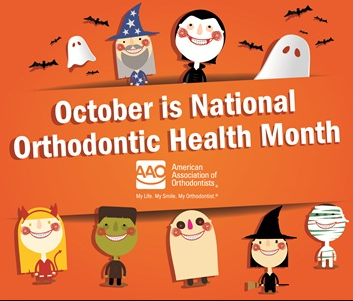With more than 1.2 million U.S. adults currently sporting braces, celebrate National Orthodontic Health Month by learning more about orthodontists and how they do more than give people a better-looking smile.
According to MouthHealthy.com, orthodontics and dentofacial orthopedics is the formal name of the dental specialty concerned with the diagnosis, prevention, intervention, guidance and correction of bad bites.
The purpose of orthodontic treatment is to create a healthy bite — straight teeth that properly meet opposing teeth in the opposite jaw. A good bite makes it easier for you to bite, chew and speak.
If your teeth are crowded, protrusive, spaced too far apart, meet in an abnormal way or do not meet at all, correction may be recommended. If you have an abnormal bite your dentist may recommend braces or another orthodontic treatment to straighten out your smile. Correcting the problem can create a nice-looking smile, but more importantly, orthodontic treatment results in a healthier mouth. Not correcting an abnormal bite could result in further oral health problems, including tooth decay, gum disease, tooth loss and jaw problems.
Braces and aligners are the “appliances” orthodontists most commonly use to guide your teeth into their proper positions. Retainers preserve and stabilize the results of your orthodontic treatment.
Since abnormal bites usually become noticeable between the ages of 6 and 12, orthodontic treatment often begins between ages 8 and 14. Treatment that begins while a child is growing helps produce optimal results. In the past, orthodontic treatment was associated with children and teens, but today many adults seek orthodontic treatment to correct long-standing problems, or problems that stem from maturational changes.

4 Simple Steps To A Healthy Mouth
Good oral health means more than a nice smile and fresh breath – though those are both benefits. Oral health is important to overall health. Poor oral health has been linked to diabetes, heart disease and stroke. Here are four simple things you can do to...

Eating CHEESE Can Prevent Tooth Decay
Now we have a good reason to enjoy cheese. The U.S. Academy of General Dentistry found that eating cheese increased production of alkaline saliva Also found that chewing cheese created a protective layer around teeth which kept remaining acid at bay But...

Can Regular Dental Check-Ups Prevent Pneumonia?
That twice-yearly trip to the dentist could do more than keep teeth and gums healthy: It may decrease the risk of pneumonia by reducing bacteria in the mouth, suggests research being presented at IDWeek 2016™. Nearly one million Americans become ill with...

